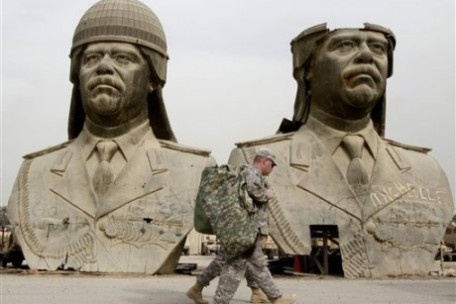The Future of Iraq

The last convoy of U.S. troops left Iraq on Sunday, closing the nine-year old file of U.S. military presence in that country which started with the invasion and occupation of Iraq in 2003. Throughout these years, more than 4500 American soldiers were killed and more than 32,000 were wounded. On the Iraqi side, the picture is gloomier: more than 100,000 killed and tens of thousands wounded. And the cost for this adventure was high: 800 billion dollars.
The U.S. decision to withdraw from Iraq was in line with Obama's promise almost three years ago during the presidential campaign. Obama was against the war when Bush started it and his campaign against this unpopular war was among the reasons that took him to the White House.
The U.S. invaded Iraq to destroy its weapons of mass destruction. While no WMDs were found, the U.S. forces marched towards Baghdad to topple Saddam Hussein. In fact, the U.S. had three main objectives when it decided to invade Iraq: to get rid of Saddam, to control the Iraqi oil and to contain Iran.
While the Americans were successful in achieving the first and to a certain degree the second objectives, they had difficulties in achieving their third objective, that is to bring Iran under control and make life miserable for it. While the Bush administration wanted to keep a semi-permanent military presence in Iraq, thus being able to keep a close eye on Iran, Obama's decision to withdraw from Iraq made it necessary for America to use other means to contain Iran, hence the propaganda war against Iran's so-called desire to fill the vacuum when the Americans leave.
The anti-Iran lobby in the U.S. and Europe has tried hard to portray Iran as the country which is trying to create a client state in Iraq. It is in this context that the current pressure against Syria by Arab countries particularly Saudi Arabia and Qatar is intended; inter alia, to contain Iran's influence in the region.
There is no doubt that, as neighboring countries, Iran and Iraq share many historical, cultural and religious commonalities. The two countries need to work with each other in order to bring about peace and prosperity for their peoples. Therefore, it is not unusual for the two neighbors to strengthen ties in all aspects. What is unusual is the attempt by certain countries far away from the region to impose a prescription for good-neighborliness and stability in the region.
After years of destruction and decades of mal-governance by the Baath Party, the Iraqi people deserve to live in peace and make a bright future for their country. It is incumbent upon the international community to help them achieve this lofty goal. No country, inside or outside the region, should be allowed to interfere in the internal affairs of Iraq. Countries in the region and those with the ability to help should work together to assist the Iraqi government and people to form a peaceful and prosperous country.

